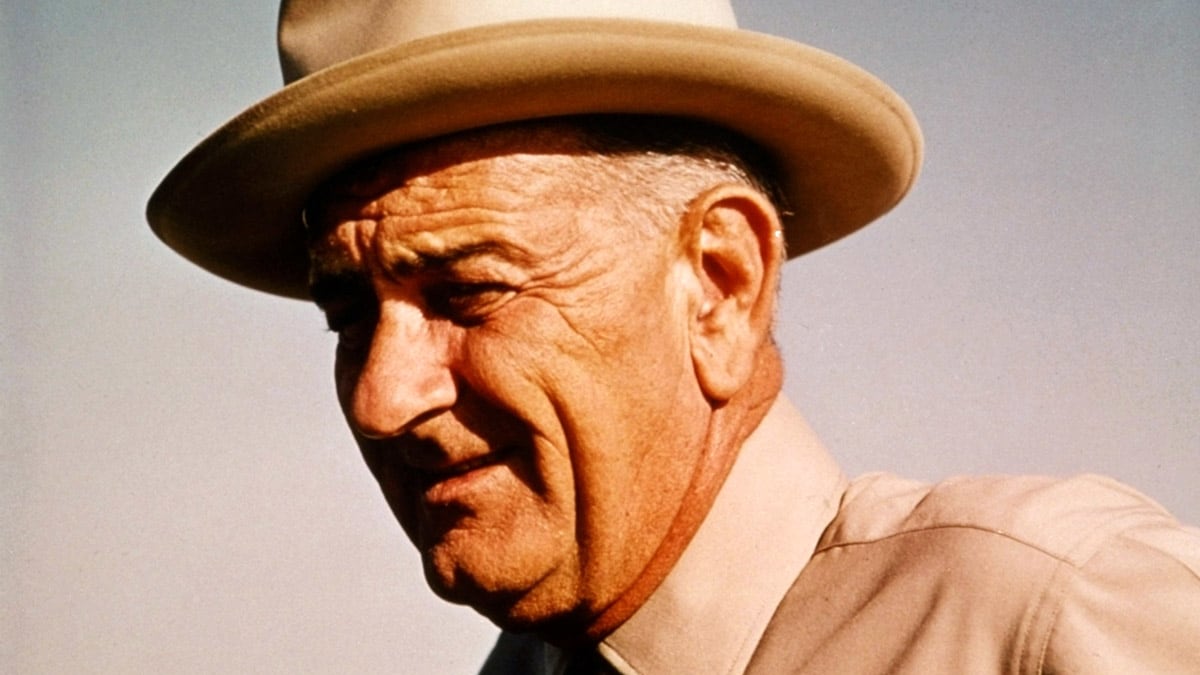Christmas 1964 was a happy time in Washington. In November, Lyndon Johnson had won the White House with the largest popular margin in American history. He had the backing of the people and huge majorities in both houses of Congress. The city hummed with excitement, waiting to see how the president would exercise his extraordinary power.
On Dec. 18, a triumphant Johnson appeared on the Ellipse outside the White House to light the national Christmas tree. Sparkling with 7,500 lights, the two-ton Adirondack was larger than any ever used before. Wearing no hat or coat, despite the subfreezing chill, Johnson smiled broadly. “These,” he said, “are the most hopeful times in all the years since Christ was born in Bethlehem.”
What could possibly go wrong?
The forces that nearly tore the nation apart in the ’60s are by now familiar: the escalation of the Vietnam War, the growing influence of the baby-boom generation, the explosion of black rage over deplorable living conditions in Northern cities, the rise of white fear and backlash. But these powerful forces came with double effect, because they fell on a country that had grown used to being told only abundance and equilibrium lay ahead. At the very center of the decade, in the year 1965, the cross currents of prosperous confidence and urgent anxiety collided. The collision would fracture the American public and shape our politics for five decades to come.

Americans living in the mid-’60s had an array of real reasons for hope. By all of the objective standards—gross national product, life expectancy, household wages, disposable income—they had a better, richer, easier life than any generation in the history of the nation. Over the prior two decades, Democratic and Republican administrations had grown the federal government as it undertook massive projects: the winning of the Second World War, the creation of a national safety net, and the vast expansion of the middle class. Man’s government, it seemed, could really solve man’s problems. Tensions between the United States and Russia had steadily diminished after the Cuban Missile Crisis of October 1962. The movement protesting segregation in the South and the landmark Civil Rights Act of 1964 inspired real hope that after 150 years of failure, this generation of Americans would be the one to finally end the scourge of racial discrimination.
Lyndon Johnson made this narrative of national progress the guiding force of his presidency. At first he did so out of necessity. President Kennedy’s assassination—sudden, awful, irrational—introduced a destabilizing, demoralizing fear. What if America’s future wasn’t going to be bright? To gain legitimacy, Johnson realized, he had to convince the country to get moving again and continue its happy progress. “This is our challenge,” he told the nation five days after the assassination, “not to hesitate, not to pause ... but to continue on our course so that we may fulfill the destiny that history has set for us.” By the time he’d been in office a month, his approval rating was above 70 percent.
The longer Johnson was president, the grander the world he promised became. In April 1964 he appeared at the opening of the New York World’s Fair, a gaudy consumerist fantasia of a technology-driven future. In his remarks, he unconsciously echoed Neville Chamberlain’s infamous declaration of “peace in our time” after Munich. “I prophesy peace is possible not only in our generation,” he said, “I predict it is coming much earlier.”
He was tempting fate, but no one was much inclined to notice. His opponent in the 1964 election, Barry Goldwater, was viewed even by the Establishment of his own party as dangerously extreme. “Abundance or annihilation,” Johnson said at the World’s Fair, effectively framing the election as a choice between his Great Society—freedom from poverty, discrimination, and disease—and the threat of nuclear war under Goldwater.Not surprisingly, the country chose abundance, and expected it would quickly come. Their president did nothing to dampen this expectation. The program for the January 1965 inaugural contained a single sentence on its first page: “All that has happened in our historic past is but a prelude to ‘The Great Society.’”But privately Johnson saw a darker future rising. Since assuming the presidency, he had, from time to time, suffered bouts of deep, self-pitying depression in which he conjured catastrophe just around the bend. “I do not believe,” he worried in the summer of 1964, “I can physically and mentally carry the responsibilities of the bomb and the world and the Negros and the South.”A week after the inauguration, his wife, Lady Bird, watched with worry as a “slough of despond” surrounded her husband. “Someday,” she told her diary, “we may really know a storm.”






